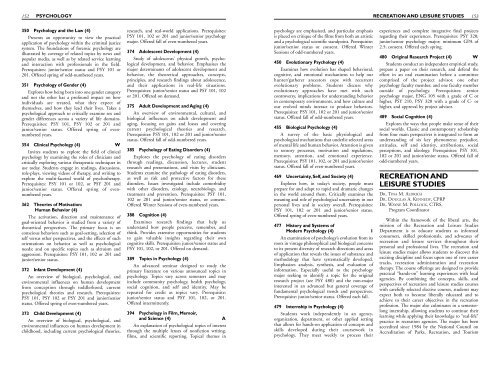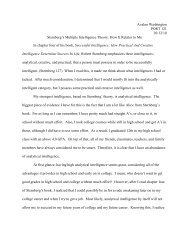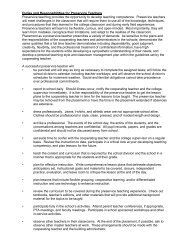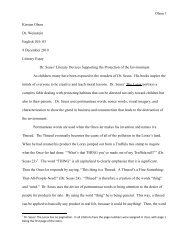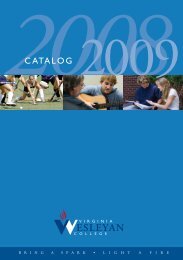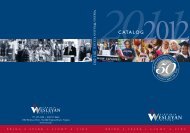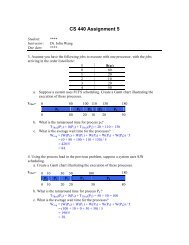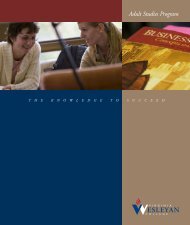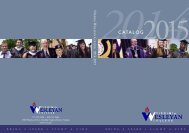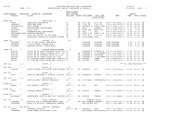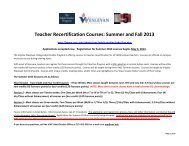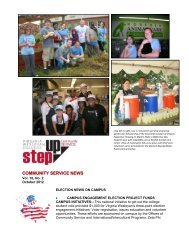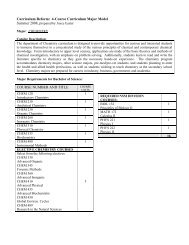2013-2014 Catalog - Virginia Wesleyan College
2013-2014 Catalog - Virginia Wesleyan College
2013-2014 Catalog - Virginia Wesleyan College
- No tags were found...
You also want an ePaper? Increase the reach of your titles
YUMPU automatically turns print PDFs into web optimized ePapers that Google loves.
152 PSYCHOLOGYRECREATION AND LEISURE STUDIES153350 Psychology and the Law (4)Presents an opportunity to view the practicalapplication of psychology within the criminal justicesystem. The foundations of forensic psychology areillustrated by coverage of related topics by news andpopular media, as well as by related service learningand interaction with professionals in the field.Prerequisites: junior/senior status and PSY 101 or201. Offered spring of odd-numbered years.351 Psychology of Gender (4)Explores how being born into one gender categoryand not the other has a profound impact on howindividuals are treated, what they expect ofthemselves, and how they lead their lives. Takes apsychological approach to critically examine sex andgender differences across a variety of life domains.Prerequisites: PSY 101, PSY 102 or 201 andjunior/senior status. Offered spring of evennumberedyears.354 Clinical Psychology (4) WInvites students to explore the field of clinicalpsychology by examining the roles of clinicians andcritically exploring various therapeutic techniques inuse today. Students engage in readings, discussions,role-plays, viewing videos of therapy, and writing toexplore the multi-faceted world of psychotherapy.Prerequisites: PSY 101 or 102, or PSY 201 andjunior/senior status. Offered spring of evennumberedyears.362 Theories of Motivation:Human Behavior (4)The activation, direction and maintenance ofgoal-oriented behavior is studied from a variety oftheoretical perspectives. The primary focus is onconscious behaviors such as goal-setting, selection ofself versus other perspectives, and the effects of suchorientations on behavior as well as psychologicalneeds; and on specific topics such as altruism andaggression. Prerequisites: PSY 101, 102 or 201 andjunior/senior status.372 Infant Development (4)An overview of biological, psychological, andenvironmental influences on human developmentfrom conception through toddlerhood, currentpsychological theories and research. Prerequisites:PSY 101, PSY 102 or PSY 201 and junior/seniorstatus. Offered spring of even-numbered years.373 Child Development (4)An overview of biological, psychological, andenvironmental influences on human development inchildhood, including current psychological theories,research, and real-world applications. Prerequisites:PSY 101, 102 or 201 and junior/senior psychologymajor. Offered fall of even-numbered years.374 Adolescent Development (4)Study of adolescents’ physical growth, psychologicaldevelopment, and behavior. Emphasizes themajor determinants of adolescent development andbehavior, the theoretical approaches, concepts,principles, and research findings about adolescence,and their applications in real-life situations.Prerequisites: junior/senior status and PSY 101, 102or 201. Offered on demand.375 Adult Development and Aging (4)An overview of environmental, cultural, andbiological influences on adult development andaging, focusing on gains and losses and coveringcurrent psychological theories and research.Prerequisites: PSY 101, 102 or 201 and junior/seniorstatus. Offered fall of odd-numbered years.385 Psychology of Eating Disorders (4)Explores the psychology of eating disordersthrough readings, discussion, lectures, studentresearch and presentations, and visits by clinicians.Students examine the pathology of eating disorders,as well as risk and protective factors for thesedisorders. Issues investigated include comorbiditywith other disorders, etiology, neurobiology, andtreatment and prevention. Prerequisites: PSY 101,102 or 201 and junior/senior status, or consent.Offered Winter Sessions of even-numbered years.388 Cognition (4)Examines research findings that help usunderstand how people perceive, remember, andthink. Provides extensive opportunities for studentsto gain valuable insights regarding their owncognitive skills. Prerequisites: junior/senior status andPSY 101, 102, or 201. Offered on demand.389 Topics in Psychology (4)An advanced seminar designed to study theprimary literature on various announced topics inpsychology. Topics vary across semesters and mayinclude community psychology, health psychology,social cognition, and self and identity. May berepeated for credit as topics vary. Prerequisite:junior/senior status and PSY 101, 102, or 201.Offered intermittently.394 Psychology in Film, Memoir,and Science (4)AAn explanation of psychological topics of interestthrough the multiple lenses of nonfiction writing,films, and scientific reporting. Topical themes inpsychology are emphasized, and particular emphasisis placed on critique of the films from both an artisticand a psychological scientific standpoint. Prerequisite:junior/senior status or consent. Offered WinterSessions of odd-numbered years.450 Evolutionary Psychology (4)Examines how evolution has shaped behavioral,cognitive, and emotional mechanisms to help ourhunter/gatherer ancestors cope with recurrentevolutionary problems. Students discuss whyevolutionary approaches have met with suchcontroversy, implications for understanding behaviorin contemporary environments, and how culture andour evolved minds interact to produce behaviors.Prerequisites: PSY 101, 102 or 201 and junior/seniorstatus. Offered fall of odd-numbered years.455 Biological Psychology (4)A survey of the basic physiological andpsychological mechanisms that underlie selected areasof mental life and human behavior. Attention is givento sensory processes, motivation and regulations,memory, attention, and emotional experience.Prerequisites: PSY 101, 102, or 201 and junior/seniorstatus. Offered fall of even-numbered years.469 Uncertainty, Self, and Society (4)Explores how, in today’s society, people mustprepare for and adapt to rapid and dramatic changesin the world around them. Critically examines themeaning and role of psychological uncertainty in ourpersonal lives and in society overall. Prerequisites:PSY 101, 102 or 201 and junior/senior status.Offered spring of even-numbered years.477 History and Systems ofModern Psychology (4)IAn examination of psychology’s evolution from itsroots in vintage philosophical and biological concernsto its present diversity of research directions and areasof application that reveals the issues of substance andmethodology that have systematically developed.Emphasizes analysis, synthesis, and evaluation ofinformation. Especially useful to the psychologymajor seeking to identify a topic for the originalresearch project (see PSY 480) and the non-majorinterested in an advanced but general coverage offundamental psychological trends and perspectives.Prerequisite: junior/senior status. Offered each fall.479 Internship in Psychology (4)Students work independently in an agency,organization, department, or other applied settingthat allows for hands-on application of concepts andskills developed during their coursework inpsychology. They meet weekly to process theirexperiences and complete integrative final projectsregarding their experiences. Prerequisites: PSY 320;junior/senior psychology major; minimum GPA of2.5; consent. Offered each spring.480 Original Research Project (4) WStudents conduct an independent empirical study,prepare a paper on their research, and defend theeffort in an oral examination before a committeecomprised of the project advisor, one otherpsychology faculty member, and one faculty memberoutside of psychology. Prerequisites: seniorpsychology major, ENG 105 with a grade of C orhigher, PSY 210, PSY 320 with a grade of C- orhigher, and approval by project advisor.489 Social Cognition (4)Explores the ways that people make sense of theirsocial worlds. Classic and contemporary scholarshipfrom four main perspectives is integrated to form anunderstanding of six key phenomena: prejudice,attitudes, self and identity, attributions, socialperceptions, and ideology. Prerequisites: PSY 101,102 or 201 and junior/senior status. Offered fall ofodd-numbered years.RECREATION ANDLEISURE STUDIESDR. TINA M. ALDRICHDR. DOUGLAS A. KENNEDY, CPRPDR. WAYNE M. POLLOCK, CTRS,Program CoordinatorWithin the framework of the liberal arts, themission of the Recreation and Leisure StudiesDepartment is to educate students as informedconsumers, skilled professionals, and advocates ofrecreation and leisure services throughout theirpersonal and professional lives. The recreation andleisure studies major allows students to discover thisexciting discipline and focus upon one of two careertracks, recreation administration and recreationtherapy. The course offerings are designed to providepractical “hands-on” learning experiences with localagencies. By combining the concepts, skills, andperspectives of recreation and leisure studies courseswith carefully selected elective courses, students mayexpect both to become liberally educated and toachieve to their career objectives in the recreationprofession. The major also culminates in a semesterlonginternship, allowing students to continue theirlearning while applying their knowledge to “real-life”practice in recreation agencies. The major has beenaccredited since 1984 by the National Council onAccreditation of Parks, Recreation, and Tourism


